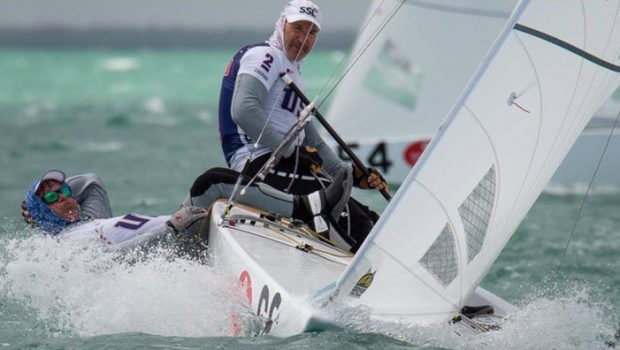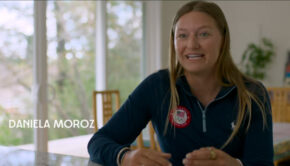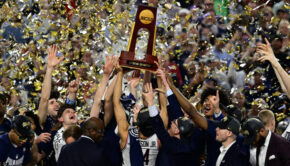Paul Cayard: Getting back to prominence
Published on July 10th, 2022
Scuttlebutt editor Craig Leweck recently met with Paul Cayard who was appointed in May 2021 to revitalize the U.S. Olympic Sailing program. This is Part 1 of the interview:
Was there a “mad as hell and I can’t take it anymore” moment that led to you accepting the position of Executive Director for US Olympic Sailing?
Kind of. Mad as hell is probably not exactly right, but I get the analogy. I was on the Olympic Sailing Committee (OSC), which is a subsidiary of the US Sailing Board. The way we used to structure the management of the Olympic team was that the board subrogated its responsibility as an NGB, National Governing Body, under the IOC structure to a committee appointed by the Board of Directors. And that committee was called the Olympic Sailing Committee.
Bruce Burton was the chairman of it most recently, and there were others before him. I sat on that board from about 2016 to 2020 and recognized a lot of dysfunction. The board had responsibility yet no power. It couldn’t hire and fire anybody. But the board had appointed the OSC to be responsible for the Olympic results, so it was a screwed-up situation.
I observed all that, and after Malcolm Page was let go in 2019, who had held the position as Chief of Olympic Sailing, what followed was how a number of people involved in the program put forward strategic plans. So there were these plans floating around, and as an OSC member, I got to read them.
But I felt these plans were off target. They focused more on the logistics set up for Tokyo 2020 rather than on deeper issues. I was like, ‘Hold on, we’ve gone down the toilet in the Olympic sailing, okay? That’s the issue here. It isn’t about the containers in Tokyo and how many credentials we’re going to have in Tokyo. We have a big problem here, and we need to fix the big problem.”
So that’s when, as a volunteer, I spoke with Cory Sertl, who at that time was the President of US Sailing, about my view. Cory agreed, and was open for suggestions about how to proceed. At this point, we needed to gather some information and do a proper strategic plan.
So I called Clay Deutsch, who was a friend of mine that I had sailed with. He had run the consulting firm McKinsey in Chicago for 20 years, so I asked Clay if I could get some professional help. He connected me with Clay Bischoff and Brian Fox. One runs Tokyo and one runs New York. Both were All Americans in College sailing, and Bischoff was College Sailor of the Year. Both Harvard grads, both massively bright, and they were interested in the project. They had watched the program and totally got what we were looking for.
This led to them gathering a team of colleagues, and after working on it for six months, they developed a strategic plan that I presented to the board. But during this time, I kind of got emotionally attached to the project, and when the board was looking for someone to execute the plan, that’s how I got here.
So mad as hell partly, but more so being emotionally invested and a believer. I’m a believer. I was part of the ’84 Olympic team. I was an alternate, but I was a big part. I got second in the Star Trials, and if I could have gone, maybe I would have got the gold medal instead of Bill Buchan.
That’s how good we were in those days, so I’ve seen the United States of America be good. I started working at North Sails in 1984 and opportunities in sailing just took off for me, which is not the situation we have today.
Is there a connectivity in which success in Olympic sailing can impact other areas of sailing in the USA?
I call it the knock-on effect. The US Olympic Sailing Program is not just about the Olympic medals we’re going to win. It’s about building a depth of talent in the United States of America, in the sailing industry, and on the water as leaders of great events like the America’s Cup, round-the-world races, and SailGP. It’s all of that.
I think it’s fair to say, particularly if you look at America’s Cup defender Team New Zealand, the core of a lot of great sailors comes from sailing Olympic boats. In the old days, it was the Star, so it was Dennis Conner and Lowell North, and Buddy Melges with the Soling. That part still holds true today, which is why this is important and why I decided to do it.
While the USA has not excelled in the Olympics, there are great achievements elsewhere.
Yes, people are making choices, and I don’t think the Olympic program in the United States has offered them a real opportunity for success. I think in England, if you’re a young kid growing up, you say, ‘Hey, Ben Ainslie did it. Shirley Robertson did it. I think I’ll do that for four or eight years.’ This is important for not only the Olympic medals but also for seeing USA again lead teams in events like the America’s Cup and SailGP, while also being motivational to the next generation.
Your predecessors had to endure opposition as they sought to change the Olympic program within the realm of youth programming and college sailing. Have you felt opposition with your initiatives?
You’re always going to have opposition to change, even if you’re 100% right. Change is hard. And you’re going to have people who want to keep their junior program the way it always was when you’re trying to tell them, “No, you need to get into foiling boards. We got to expose the kids to the iQFoiL.”
There can be a number of topics that you could discuss with people, but I feel like in the time I’ve been on, nearly a year and a half, some of the big-picture themes are catching a significant amount of support. I would say that raising $18 million in the first year is a testimony to that; there is a group of people who get what we’re doing and why it’s important, but it’s not easy.
College sailing is a great example. I’m really trying hard to find a way to gain value out of the 7,600 collegiate students who sail three or four days a week. If you think about the power of that, we need to harness that and somehow convert a certain portion of that to Olympic sailing skill.
So the Olympic program is not discouraging education?
Correct. Education is number one, and the college opportunity in the United States through sailing is fantastic. Some of the best schools in the country are the best schools in collegiate sailing. Boston College, Yale, Stanford, Georgetown… so that’s a great opportunity. And really, from a life standpoint, that’s number one.
The issue is, is it reasonable for a person to also pursue being an Olympian. That’s an amazing life experience. So what I’m saying– I’m not discouraging education at all. I’m asking that if within the nine months, the students at college– if there can be some room for those who want to push to pursue their Olympic sailing, high-performance sailing a bit more than they currently do.
They basically sail the collegiate boats almost the full college year, nine months. I’m just saying, isn’t there a way that we can work together to give them more opportunity and not just rely on the summer vacation?









 We’ll keep your information safe.
We’ll keep your information safe.